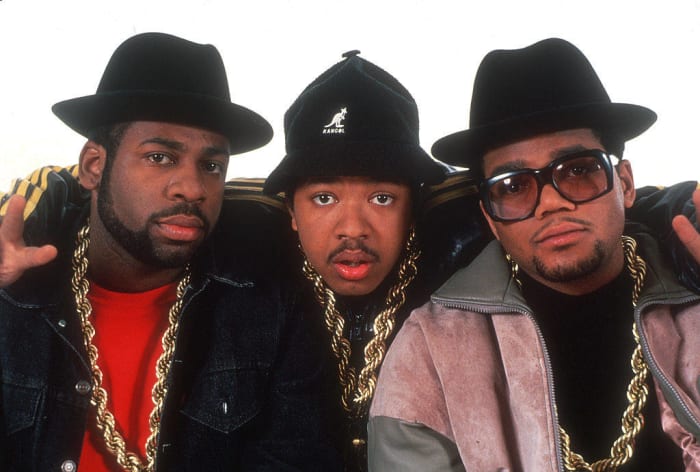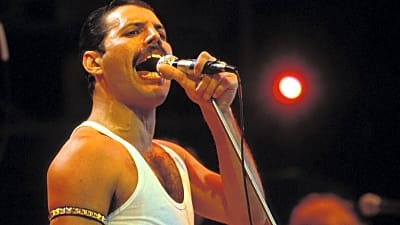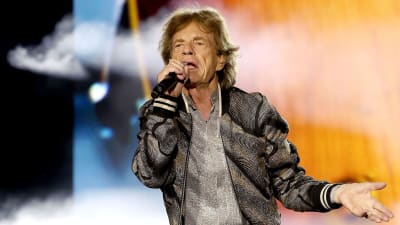What does it mean to "change the game" in hip-hop? As a genre that is forever growing, forever evolving, it can mean many things and still be valid. In 1989, the Beastie Boys released "Paul's Boutique," a triumph at the time for what it was able to accomplish from a production standpoint as well as marking an evolution for the band and hip-hop as a whole. To celebrate the 30th anniversary of this groundbreaking album, we share our list of the 20 hip-hop albums we feel changed the game forever.
1 of 20
Run D.M.C. - "Raising Hell" (1986)
Michael Ochs Archives/Getty Images
It's the album that proved hip-hop was not only commercially viable but also had major crossover appeal thanks to a cover of Aerosmith's "Walk This Way." Run D.M.C. became a household name after the groundbreaking success of the video collaboration with Aerosmith, giving the group and the genre the crossover clout via MTV that was previously unheard of.
2 of 20
Salt-N-Pepa - "Cool, Hot & Vicious" (1986)
Michael Ochs Archives/Getty Images
Salt-N-Pepa, via its debut album, "Hot, Cool & Vicious," made history by becoming the first album by a female rap group to earn both gold and platinum status in U.S. album sales. Riding the wave of its smash single "Push It," the group placed women firmly on the hip-hop map, gaining new fans and influencing new acts along the way.
3 of 20
Boogie Down Productions - "Criminal Minded" (1988)
Michael Ochs Archives/Getty Images
The debut album from New York-based artists Boogie Down Productions is significant in that it features the first "diss track," "The Bridge is Over," using samples from M.C. Shan's "The Bridge," kicking off what would be known as "The Bridge Wars," signifying the first hip-hop rivalry that would become a staple of the genre.
4 of 20
Public Enemy - "It Takes a Nation of Millions to Hold Us Back" (1988)
Michael Ochs Archives/Getty Images
The second studio album from Public Enemy, "It Takes a Nation of Millions to Hold Us Back" is the group's major foray into politically conscious hip-hop, showing the music industry that rap music wasn't just for parties. Considered by many across genres as one of the most influential hip-hop albums in history, Public Enemy managed to both innovate and change a still relatively young genre.
5 of 20
M.C. Lyte - "Lyte as a Rock" (1988)
Raymond Boyd/Getty Images
The debut from M.C. Lyte is a game-changer by its very existence. In 1988, hip-hop was almost exclusively male, but the release of "Lyte as a Rock" signified the first major studio album by a female rapper. It didn't hurt that the album, featuring top-notch production by Prince Paul, was an instant success and ranks as one of the most influential albums of all time.
6 of 20
N.W.A. - "Straight Outta Compton" (1988)
Raymond Boyd/Michael Ochs Archives/Getty Images
While Public Enemy changed the game out east with tits brand of politically charged hip-hop, producer Dr. Dre and lyricist Ice Cube dropped a bomb of their own with N.W.A.'s "Straight Outta Compton." Featuring socially conscious lyrics that gave an unprecedented look into the plight of young black males in South Central L.A., "Straight Outta Compton" further changed the game by giving a voice to a group of people routinely demonized in the media.
7 of 20
EPMD - "Strictly Business" (1988)
Michael Ochs Archives/Getty Images
The debut album by EPMD is notable for the way in which it utilized heavy sampling to create a unique and danceable sound. To be sure, EPMD did not pioneer sampling, but what it accomplished with "Strictly Business" is present audiences with a near-flawless album that still resonates with true hip-hop aficionados today.
8 of 20
Beastie Boys - "Paul's Boutique" (1989)
Martyn Goodacre/Getty Images
Taking a wholly different path from the Beastie Boys' groundbreaking debut, "Paul's Boutique" features samples from a whopping 105 songs. While the album is a certified classic today, what makes it groundbreaking are the legal implications. As was long the standard, the sampled tracks in "Paul's Boutique" were uncleared, leading to a sea-change due to the landmark Grand Upright Music, Ltd. v. Warner Bros. Records Inc. civil case that resulted in artists receiving royalties for sampled music.
9 of 20
A Tribe Called Quest - "The Low End Theory" (1991)
Al Pereira/Michael Ochs Archives/Getty Images
The second studio album from ATCQ was an evolution for the band and an upgrade for the genre. Relying on sampling that focused on mid-century jazz, "The Low End Theory" changed the game by making hip-hop more versatile and, dare we say it, cool. The legacy of "The Low End Theory" is in the way it influenced hip-hop for more than a generation, with a bevy of popular producers and acts pointing to this album as the inspiration for their own music.
10 of 20
Cypress Hill - "Cypress Hill" (1991)
Bob Carey/Los Angeles Times via Getty Images
The debut from Southern California crew Cypress Hill broke ground and changed the game in a couple of ways. This was the first Latino rap group to release a successful studio album and also the first to base its music within cannabis culture, which at the time was still largely taboo. To be sure, weed was a part of hip-hop for years, but Cypress Hill was the first to approach it from an advocacy standpoint, making the group crossover hits nearly overnight.
11 of 20
Dr. Dre - "The Chronic" (1992)
Jeff Kravitz/FilmMagic
When Dr. Dre left N.W.A., he was looking to create something huge. Teaming with former bodyguard turned music publisher Suge Knight, the pair founded Death Row Records, with its first major project being "The Chronic." Featuring a giant cast of up-and-coming rappers, "The Chronic" cemented West Coast hip-hop into the musicscape in a way that even N.W.A. couldn't while also making G-funk an extremely popular subgenre that spawned a number of side projects.
12 of 20
Wu-Tang Clan - "Enter the 36 Chambers" (1993)
Ron Galella, Ltd./Ron Galella Collection via Getty Images
While West Coast hip-hop was all the rage, effectively shutting out the founding East, producer Robert Diggs, better known as RZA, assembled a collective that would shift attention back to New York with the Wu-Tang Clan's "Enter the 36 Chambers." Revolutionizing the game by using samples from kung-fu films as opposed to just music, RZA changed the game even further by giving the album a cinematic feel unheard of at the time.
13 of 20
Beastie Boys - "Ill Communication" (1994)
Jeff Kravitz/FilmMagic
Not a group to rest on its laurels or avoid innovation, the Beastie Boys’ and its album "Ill Communication" took the hip-hop game into uncharted waters through the ingenious blending of punk and rap via songs like the MTV classic "Sabotage." The band also broke social norms by confronting the sort of misogyny standard in hip-hop, showing a stark evolution in its own views since its debut.
14 of 20
The Fugees - "The Score" (1995)
Jeff Kravitz/FilmMagic
The second studio album from The Fugees was, in actuality, its big debut. "The Score," with its mix of funky R&B and rap tracks, further opened up hip-hop for crossover artists,. But the true game-changer came in the form of Lauryn Hill, whose cover of Roberta Flack's "Killing Me Softly" rocketed the group into superstardom. In retrospect, "The Score" serves as a hip-hop equivalent to concept albums like the Who's "Tommy."
15 of 20
Eminem - "The Marshall Mathers LP" (2000)
Michel Linssen/Redferns
To be sure, in 2000 hip-hop was already a well-established, widely popular genre. But with the release of Eminem's "The Marshall Mathers LP," the game not only changed, but it also skyrocketed. The album has the distinction of being the fastest-selling record by a solo artist in history, depicting just how hungry audiences were not just for Eminem but also for the genre as a whole.
16 of 20
Missy Elliott - "Miss E…So Addictive" (2001)
Steve Eichner/Getty Images
With a new millennium comes a new sound, and for Missy Elliott, her contribution was the well-received "Miss E...So Addictive." Featuring production from partner-in-crime Timbaland, the album is a futurists' look at hip-hop, techno and R&B, with an eclectic mix that cemented Missy as a true star and pushed the genre into a new era of sound.
17 of 20
Roots Manuva - "Run Come Save Me" (2001)
Adam Gasson/Redferns/Getty Images
On the scene since 1994, Roots Manuva finally hit paydirt with his second studio album, "Run Come Save Me." Before Roots, hip-hop in the United Kingdom was mostly cheesy and not to be taken seriously. The album's grounded sound and honest lyrics injected a freshness that transcended the Atlantic, giving the U.S. its first bona fide hip-hop star whose sound worked in the States as well as it did back home, creating a path for other U.K. artists to follow.
18 of 20
Kanye West - "My Beautiful Dark Twisted Fantasy" (2010)
Stephen Lovekin/WireImage
Playing out like the fever dream of a musical savant, Kanye West once again changed the game with what is, without question, his magnum opus. "My Beautiful Dark Twisted Fantasy" is the realization of hip-hop as a movement more than a genre. Kanye takes multiple musical styles, from soul to prog rock and baroque to techno, and creates an ultimate commentary on culture, celebrity and how he views the hip-hop landscape through his eyes.
19 of 20
Jay-Z & Kanye West - "Watch the Throne" (2011)
Kevin Mazur/WireImage
For years, Kanye West served as the backbone for much of Jay-Z's best albums. With "Watch the Throne" the pair appear as equals, further changing the game by reinvigorating the collaboration in hip-hop, creating a super group without a name and delivering tracks that sound and feel like a pair at the absolute top of their game.
20 of 20
Kendrick Lamar - "good kid, m.A.A.d city" (2012)
Jeff Kravitz/FilmMagic
Following in the footsteps of The Fugees, Kendrick Lamar's debut studio album is cinematic in its own right. But while The Fugees took a lighter, almost nostalgic touch, Lamar creates a stylistic hybrid mixing his Midwest and West Coast sensibilities to create a sound that doesn't belong to any one discipline and yet propels hip-hop into its next, more modern iteration.

 +
+



























